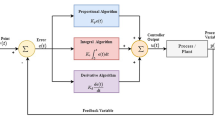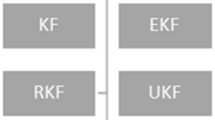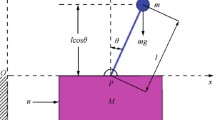Abstract
Model-Free Control (MFC) is used to control a complex system by designing a simple representation of the system, known as ultralocal model. This MFC continuously updates the input-output behavior with the help of ultralocal model. The combination of MFC with standard Proportional Integral Derivative (PID) controller develops Intelligent Proportional Integral Derivative (i-PID) controller. The i-PID controller is basically a class of robust control technique in the field of PID controller. In this methodology, the tuning is quite straightforward for extremely nonlinear and/or time varying plants, without consideration of any modeling procedure. In Model Reference Adaptive Controller (MRAC)-PID controller principle, PID parameters are updated/tuned in accordance with control technique based on MRAC-Massachusetts Institute of Technology (MIT) rule, such that the plant is efficient to follow the reference model. The main objective of this paper is to implement MRAC based Intelligent PID controller for a class of dynamical systems using Model-Free Control technique, where the prior knowledge about the system dynamic is not essential and moreover complex parameter tuning is not necessary.




Similar content being viewed by others
Abbreviations
- i-P:
-
Intelligent Proportional
- i-PD:
-
Intelligent Proportional Derivative
- i-PI:
-
Intelligent Proportional Integral
- i-PID:
-
Intelligent Proportional Integral Derivative
- MFC:
-
Model-Free Control
- MIT:
-
Massachusetts Institute of Technology
- MRAC:
-
Model Reference Adaptive Controller
- PID:
-
Proportional Integral Derivative
References
Fliess M and Join C 2009 Model-free control and intelligent PID controllers: Towards a possible trivialization of nonlinear control. In: Proc.15th IFAC Symp. Syst. Identificat. (SYSID). 1531–1550
Fliess M and Join C 2013 Model-free control. Int. J. Control. 1–25
Fliess M and Join C 2021 An alternative to proportional-integral and proportional-integral-derivative regulators: Intelligent proportional-derivative regulators. Int. J. Robust Nonlinear Control. 1–13
Fliess M and Join C 2008 Intelligent PID Controllers. Mediterranean Conference on Control and Automation. 326–331
Fliess M and Join C 2009 Model-Free Control and Intelligent PID Controllers: towards a Possible Trivialization of Nonlinear Control. Proceedings of the 15th IFAC Symposium on System Identification. 1531-1550
Åström K and Hägglund T 2001 The future of PID control. Control Eng. Pract. 9(11): 1163–1175.
Astrom K, Hagglund T, Hang C C and Ho K W 1993 Automatic tuning and adaptation for PID controllers-A survey. Control Eng. Pract. 1(4): 699–714.
Fliess M and Join C 2014 Stability margins and model-free control: A first look. European Control Conference. 454–459
Doye N I, Asiri S, Aloufi A, Al-Awan A and Laleg-Kirati M T 2019 Intelligent proportional–integral–derivative control-based modulating functions for laser beam pointing and stabilization. IEEE Trans. Control Syst. Technol. 1–8
Michel L, Join C, Fliess M, Sicard P and Chériti A 2010 Model-free control of DC/DC converters. IEEE 12th Workshop on Control and Modeling for Power Electronics (COMPEL). 1–8
Miras D J, Join C, Fliess M, Riachy S and Bonnet S 2013 Active magnetic bearing: A new step for model-free control. In: Proc. IEEE Conf. Decision Control. 7449–7454
Lafont F, Balmat F J, Pessel N and Fliess M 2015 A model-free control strategy for an experimental greenhouse with an application to fault accommodation. Comput. Electron. Agric. 110: 139–149.
Menhour L, D’Andréa-Novel B, Fliess M and Mounier H 2013 Multivariable decoupled longitudinal and lateral vehicle control: A model free design. In Proc. IEEE Conf. Decision Control. 2834–2839
Choi S, D’Andréa-Novel B, Fliess M, Mounier H and Villagra J 2009 Model-free control of automotive engine and brake for stop-and-go scenarios. In: Proc. Eur. Control Conf. 3622–3627
Astrom J K and Wittenmark B 2001 Adaptive Control. Pearson Education Asia. 185–225
Jain P and Nigam J M 2013 Design of a model reference adaptive controller using modified MIT rule for a second order system. Adv. Electron. Electric Eng. 3(4): 477–484.
Singh B and Kumar V 2015 A Real Time Application of Model Reference Adaptive PID Controller for Magnetic Levitation System IEEE Power, Communication and Information Technology Conference (PCITC).583–588
Swathi M and Ramesh P 2017 Modeling and Analysis of Model Reference Adaptive Control by Using MIT and Modified MIT Rule for Speed Control of DC Motor. IEEE 7th International Advance Computing Conference. 482–486
Swarnkar P, Jain K S and Nema K R 2011 Comparative analysis of MIT rule and lyapunov rule in model reference adaptive control scheme. Innov. Syst. Design Eng. 2(4): 154–162.
Pirabakaran K and Becerra M V 2001 Automatic tuning of PID Controllers using Model Reference Adaptive Control Techniques Proceedings of the 27th Annual Conference of the IEEE Industrial Electronics Society. 1: 736–740
Xiong A and Fan Y 2007 Application of a PID Controller using MRAC Techniques for Control of the DC Electromotor Drive IEEE International Conference on Mechatronics and Automation.2616–2621
Younes A Y, Drak A, Noura H, Rabhi A and Hajjaji E A 2016 Robust model-free control applied to a quadrotor UAV. J. Intell. Robotic Syst. 84: 37–52.
Madonski R and Herman P 2013 Model-free control of a two dimensional system based on uncertainty reconstruction and attenuation. Conference on Control and Fault-Tolerant Systems (SysTol). 542–547
Andary S, Chemori A, Benoit M and Sallantin J 2012 A Dual Model-Free Control of Underactuated Mechanical Systems, Application to The Inertia Wheel Inverted Pendulum. Proc. American Control Conference, 1029–1034
Novel A D B, Fliess M, Join C, Mounier H and Steux B 2010 A mathematical explanation via "intelligent" PID controllers of the strange ubiquity of PIDs. 18th Mediterranean Conference on Control and Automation. 395–400
Krishnaswamy K 2009 Process Control. New Age International Publishers, pp 14–15.
Nagrath I J and Gopal M 2009 Control Systems Engineering. New Age International Publishers, pp 52–57.
Author information
Authors and Affiliations
Corresponding author
Rights and permissions
Springer Nature or its licensor (e.g. a society or other partner) holds exclusive rights to this article under a publishing agreement with the author(s) or other rightsholder(s); author self-archiving of the accepted manuscript version of this article is solely governed by the terms of such publishing agreement and applicable law.
About this article
Cite this article
Mallick, S., Mondal, U. MRAC based intelligent PID controller design technique for a class of dynamical systems. Sādhanā 49, 166 (2024). https://doi.org/10.1007/s12046-024-02457-4
Received:
Revised:
Accepted:
Published:
DOI: https://doi.org/10.1007/s12046-024-02457-4




